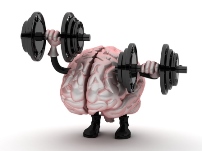Can Brain Training Work?
Material for this blog comes from a recent article published on SharpBrains.com entitled “Can brain training work? Yes, if it meets these 5 conditions“. It is an adapted excerpt from the new book “SharpBrains Guide to Brain Fitness: How to Optimize Brain Health and Performance at Any Age” (April 2013; 284 pages). This user-friendly and thought-provoking how-to guide cuts through the clutter of media hype about the latest “magic pill” for better brain health, offering proven, practical tips and techniques that anyone can use to maintain and enhance brain function throughout life and even ward off cognitive decline.

Under what conditions can brain training work?
In a modern society we are confronted with a wide range of increasingly abstract and interconnected problems. Successfully dealing with such an environment requires a highly fit brain, capable of adapting to new situations and challenges throughout life. Because of this, we expect cross-training the brain to soon become as mainstream as cross-training the body is today.
How is brain training different from mental stimulation?
Anything we do involving novelty, variety, and challenge stimulates the brain and can contribute to building capacity and brain reserve.
For instance, learning how to play the piano activates a number of brain functions (attention, memory, motor skills, etc.), which triggers changes in the underlying neuronal networks. Indeed, musicians have larger brain volume in areas that are important for playing an instrument: motor, auditory and visuospatial regions. However, we need to recognize that such an activity may take thousands of hours before paying off in terms of brain fitness. It constitutes a great and pleasurable mental effort, and helps build cognitive reserve, but it is different by nature from more targeted, efficient, and complementary brain training interventions. I should know. I’m a musician, and although the mental effort that I expended learning to play the piano to perfection helped build my cognitive reserve, it was certainly different from any targeted, efficient, and complementary brain training interventions that I ever experienced.
Under what conditions can brain training work?
This is the million dollar question.
Why do we still often hear that brain training does not work? Because of the different understandings of what “brain training” and “work” mean.
Brain training must transfer to benefits in daily life
The most critical factor in determining whether a brain training method or program works is the extent to which the training effects “transfer” to benefits in daily life. For instance, practice usually triggers improvement in the practiced task. Based on analysis of dozens of documented examples of brain training techniques that “work” or “transfer,” it is proposed that five conditions must be met for any kind of brain training, from meditation to technology-based programs, to translate into meaningful real world improvements:
Specifically, for brain training to work, it must meet the following five conditions:
It must engage and exercise a core brain-based capacity or neural circuit identified to be relevant to real-life outcomes. Three examples of Core brain-based capacities: executive attention, working memory, speed of processing and emotional regulation. Many supposed “brain training” games fail to provide any actual “brain training” because they were never really designed to target specific and relevant brain functions.
It must target a performance bottleneck
A critical question to ask is: Which brain function do I need to optimize? The question becomes: Is the goal to optimize these cognitive skills? Concentration? Memory? Regulating stress and emotions? If you need to train your executive functions, for example, but use a program designed to enhance speed of processing, you may well conclude that this program does not “work.” However, this program may work for somebody whose bottleneck is speed of processing (as often happens in older adults).
A minimum “dose” of 15 hours total per targeted brain function, performed over 8 weeks or less, is necessary for real improvement
Training only a few hours across a wide variety of brain functions, such as in the “BBC brain training” experiment, should not be expected to trigger real-world benefits.
Training must adapt to performance, require effortful attention, and increase in difficulty
Consider the number of hours you have spent doing crossword or Sudoku puzzles, or mastering any new subject for that matter, in a way that was either too easy for you and became boring or way too difficult and became frustrating.
Continued practice is required for continued benefits
One-time brain training activity will not yield lifelong benefits. Remember that “cells that that fire together wire together” . A minimum dose of brain training activity is a threshold to start seeing some benefits. Continued practice is a final condition for transfer to real-world benefits over time.
Conclusion
From my own experience, I can attest to the fact that brain training most certainly does work. When you improve these cognitive skills: concentration, memory , stress-reduction and emotions, executive functions, you can better function in life.
Other brain games can be found under the heading “See Our Blogs”, by clicking any of the published blogs on the pages for the following categories:
“Brain Games For Children”
“Brain Games For Adults”
“Brain Games For Seniors”
“Advanced Brain Training”
“Optimal Brain Health”


I can see that you are becoming a brain expert! I am following your briefings and analysis with interest!
Thanks for your comment, Nellya. I’ll have more interesting blogs to publish soon.